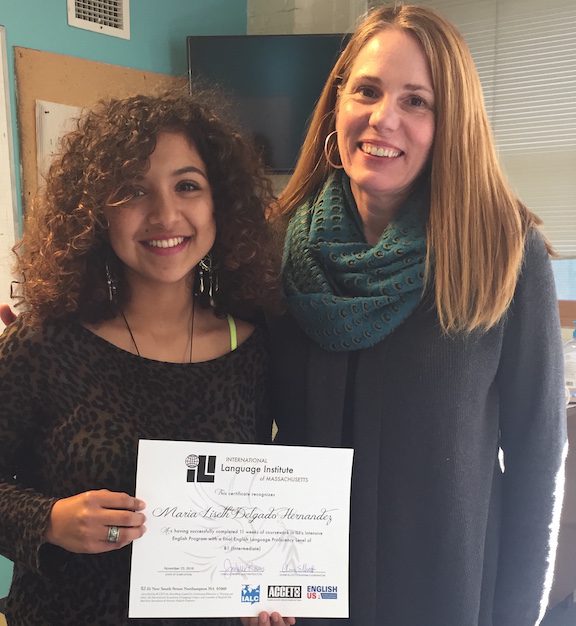
Learning English quickly and effectively is a goal for many international students, immigrants, and professionals. Intensive English Programs (IEPs) are one of the most efficient ways to achieve this goal. But what makes an intensive program so effective, and how do you know if it’s the right choice for you? In this article, the team will explore what an intensive English program entails, how it compares across different schools, and what advantages it offers to different types of learners.
What is the Purpose of an Intensive English Program?
An Intensive English Program is designed to immerse you in the English language.
Unlike ‘extensive’ language courses that might meet once or twice a week (like our world language courses), an intensive program involves multiple hours of instruction every day and additional opportunities to learn English on top.
The idea is to create a learning environment that mimics how you would naturally acquire a language—through constant exposure, practice, and interaction.
The primary purpose of an Intensive English Program is to help you achieve fluency in English as quickly as possible.
This is particularly important for individuals who have specific goals, such as passing the TOEFL or IELTS exams, preparing for academic studies in an English-speaking country, or improving communication skills for professional advancement. By focusing on all aspects of the language – speaking, listening, reading, and writing – an IEP provides a comprehensive approach that enables rapid improvement.

How Many Hours a Day is an Intensive English Course at the International Language Institute of Massachusetts?
Schools that are members of EnglishUSA, like the International Language Institute of Massachusetts (ILI), follow specific standards for defining what an intensive course entails.
Generally, an intensive English program is defined as offering between 18 to 21 hours of instruction per week. This classification ensures that when a school labels a program as “intensive,” it meets a certain standard of rigorous, consistent exposure to the language.
At the International Language Institute of Massachusetts (ILI), the Intensive English Program offers a full 21 hours of classroom instruction per week. These hours are spread across five days, ensuring that you get the consistent, daily exposure needed to build your language skills effectively.
The curriculum includes a mix of grammar, vocabulary, reading, writing, and speaking practice. Each session is designed to be interactive and engaging, helping you to not only learn the language but also to practice using it in real-life situations.
The goal is to help you feel more confident and comfortable using English in everyday conversations as well as in more formal settings like academic or professional environments.
What Are the Advantages of Studying an Intensive English Course?
An Intensive English Program offers several advantages that can make it the right choice for you, depending on your learning style, goals, and needs.
Here are some of the key benefits:
Advantage 1: Faster Language Acquisition
One of the biggest advantages of an IEP is the speed at which you can learn English.
The consistent, daily exposure to the language allows you to absorb and practice new vocabulary, grammar, and sentence structures more quickly than you would in a less intensive course.
This is especially beneficial if you need to achieve a certain level of proficiency in a short amount of time, such as for academic or professional reasons.
Advantage 2: Immersive Learning Environment
One of the standout features of the Intensive English Program (IEP) at the International Language Institute of Massachusetts is the immersive learning environment that extends far beyond the classroom.
While your daily lessons provide a solid foundation in grammar, vocabulary, reading, writing, and speaking, ILI also integrates additional components into the program to ensure that your exposure to English is constant, varied, and engaging.
Firstly, ILI organizes trips and excursions to local places of interest.

These outings are more than just fun breaks from class—they are integral parts of the learning experience. Whenever appropriate, these trips are guided by a local expert or accompanied by your teacher, who will offer insights and commentary in English.
This not only enhances your understanding of the local culture and history but also provides a structured opportunity to practice listening and speaking in real-world contexts.
Another key aspect of immersion at ILI is the carefully selected homestay families.
Staying with a local family allows you to continue practicing English outside of school hours in a natural, supportive environment.
Homestay families are chosen not just for their hospitality, but also for their willingness to engage with you in daily conversations, helping you apply what you’ve learned in class to everyday life. This kind of cultural and language immersion is invaluable, as it gives you the chance to experience American life first-hand while constantly reinforcing your language skills.
When you’re not in class or out exploring, you’ll find that even your down time at the school is filled with opportunities to practice English.

During breaks, you’ll chat with other students, sharing experiences and practicing conversational English in a relaxed setting. ILI fosters a warm, welcoming atmosphere, where students often celebrate occasions like birthdays together over drinks and cakes. This sense of community makes it easy to immerse yourself in the life of the ILI family. Many students find that they quickly become part of a close-knit, supportive, and happy group that feels like a long-time family.
These additional elements of ILI’s IEP ensure that you’re not just learning English in the classroom—you’re living it every day. Whether you’re exploring the local area, sharing a meal with your homestay family, or chatting with classmates, you’re constantly surrounded by English. This continuous exposure is one of the most effective ways to achieve fluency, as it helps you to naturally absorb the language and become comfortable using it in a variety of settings.
Advantage 3: Structured Learning and Accountability
If you know that you perform best with a clear structure and regular deadlines, an intensive English program might be ideal for you. The structured schedule of daily classes helps you stay on track with your learning goals.
Additionally, being surrounded by other students who are also committed to learning English creates a sense of accountability and motivation that can help you push through challenges and make consistent progress.
Advantage 4: Comprehensive Skill Development
Intensive English courses are designed to improve all aspects of your language skills – speaking, listening, reading, and writing. This comprehensive approach ensures that you are not just learning to pass a test, but that you are developing the skills needed to use English effectively in real-world situations. Whether you are preparing for university, looking to advance your career, or simply wanting to communicate better in English, an IEP can provide the training you need.
Advantage 5: Cultural Integration
For many international students, studying English is not just about learning the language – it’s also about understanding the culture. Intensive English programs often include cultural activities and opportunities to interact with native speakers, helping you to better understand the cultural nuances and social norms of English-speaking countries.
This cultural integration can be invaluable, especially if you are planning to live, study, or work in an English-speaking environment.





So… Are Intensive English Programs Effective?
The short answer is yes, but let’s break it down.
An Intensive English Program at the International Language Institute of Massachusetts, for example, adds about an extra hour a day of focused English instruction compared to a regular immersive English class. Over a week, this means you get approximately five additional hours of high-quality, level-appropriate exposure to English.
This extra time isn’t just about doing more work – it’s about giving you more opportunities to really engage with the language in a way that matches where you are in your learning journey.
Think of it this way: You could spend those extra hours trying to strike up conversations in cafes or shops, which is great, and you should do that too! But those snippets of conversation can be hit or miss when it comes to moving your learning forwards. Without a teacher to gently correct your mistakes, explain new language, and help you retain what you’ve learned, those informal chats might not be as effective.
When you compare this to, say, taking a few one-on-one English lessons per week (which is an option if you live locally), an Intensive English Program offers much more in terms of consistent practice and comprehensive skill development over what is generally a shorter period of time.
The classroom setting, combined with the structured learning environment, allows you to absorb new language more readily and apply it in real-time with the support of a teacher and peers.
Plus, if you’ve made the trip all the way to Northampton, Massachusetts, to study English in the USA, it makes sense to get the maximum level of tuition and teacher input! After all, you can always study on your own, but getting the full immersive experience with expert guidance is something special that you won’t replicate so easily back home.
In conclusion, Intensive English Programs are highly effective for those who are committed to learning and ready to immerse themselves in the language.
Whether you are preparing for academic studies, improving your professional skills, or simply wanting to become more fluent in English, an IEP can help you achieve your goals faster and more efficiently than other methods.
But always check the smallprint and be sure you’re getting maximum value for money from your chosen English language school – a full amount of tuition, great trips, teachers and staff that genuinely care about you, and an environment which is going to support your learning objectives.
Related articles:
- Why Northampton, Massachusetts is a Great Place to Learn English
- What is an Intensive English Program?: A Complete Guide
- Top 7 Reasons to do an Intensive English Program (IEP) in the Summer
- Why Study a Language in Western Massachusetts? Here are 11 Reasons
- Why Northampton, Massachusetts is a Great Place to Learn English
- ESL classes: What are the objectives and aims of English language students?
- Intensive English: Top 6 Really Easy Tips and Tricks to Enjoy Mastering Your English